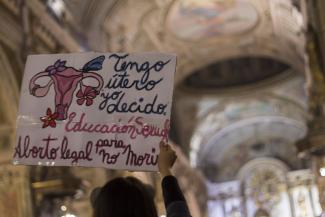Comment
Women’s lost right

When Congress decided on short notice on 7 July to postpone a vote on a reform to Chile’s abortion law, it provoked an outcry in the media and from women’s rights organisations. Chile has one of the most restrictive abortion policies in the world. Even therapeutic abortion is punishable: Both the woman and the doctor face up to five years in prison. According to estimates by the Ministry of Health, every year as many as 150,000 abortions are performed illegally and often unsafely, sometimes with life-threatening consequences for the woman. The legislation proposed by Michelle Bachelet’s government would at least make therapeutic abortion legal in three specific cases: when the life of the mother is at risk, when the foetus is not viable and when the pregnancy is the result of rape.
The legal situation in Chile seems particularly absurd in light of the fact that Chilean women had the right to therapeutic abortion for almost 70 years. However, the relevant 1931 law was repealed under the dictatorship of Augusto Pinochet. In 1989, shortly before losing power, Pinochet responded to the demands of intellectual Jaime Guzmán, who once stated: “Every abortion is murder. Enduring all the negative or painful consequences of pregnancy is the fate that God has chosen for us.”
Since the return of democracy 25 years ago, Chilean women’s rights and health organisations, along with a few progressive Catholic groups, have campaigned for the re-legalisation of therapeutic abortion. International organisations have pointed out that Chile is violating its citizens’ right to sexual and reproductive freedom, and the UN Human Rights Committee has officially urged the country to stop penalising abortion. Surveys suggest that the Chilean people want therapeutic abortion to be made legal too. But the Catholic Church, ultraconservative groups and right-leaning members of Congress have blocked all efforts for reform.
Therefore Chile has disregarded women’s legitimate claim to abortion for 25 years. For a quarter of a century, women have been denied a right that most other countries in the world would grant them. Our mothers and grandmothers were permitted to end pregnancy for therapeutic reasons, but we are not. In 1985, my mother had an abortion in a public hospital after it was determined that the foetus would die of internal deformities. It was a quick and safe procedure, and no one reproached her for her decision.
Today, many women in Chile suffer from being forced to carry a foetus that will die at birth. Others are forced to carry the child of their rapist, which is even worse when the victim is a minor. These girls have often been raped by a close relative. Some of them are disadvantaged youth who have no access to sexual education or contraception.
Therefore, the legalisation of therapeutic abortion in the three cases mentioned above is the very least that is required from an ethical standpoint. We demand free legal abortion up to the 12th week of pregnancy. Abortion should be permitted after that point in three instances: when the life of the mother is at risk, when the foetus is not viable and for rape victims under the age of 14.
We women have the right to make decisions about our own bodies and whether we wish to become pregnant. We do not want to be punished for these decisions. The government has a responsibility to give us access to health care and to guarantee that the rights of all women, but especially of poor women and girls, are respected. In a conservative country like Chile, the right to abortion is a debt the state owes to women. We still have a long way to go and don’t know how this journey will end.
Tania Cadima is a Chilean activist on the gender front of the party Movimiento Revolución Democrática.
tcadima@gmail.com







